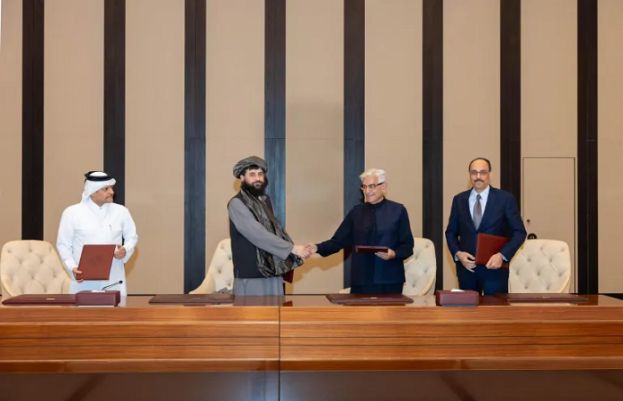Pakistan and Afghanistan have reached a landmark ceasefire agreement, signaling a potential breakthrough in efforts to restore peace and stability along their tense border, Qatar’s Foreign Ministry announced late Sunday night. According to Qatari officials, the ceasefire, mediated by Qatar and Turkiye, is expected to provide a strong foundation for lasting peace in the region. Both countries have also agreed to hold follow-up meetings in the coming days and to establish a permanent mechanism to ensure ongoing peace and stability between them. “During the negotiations, both sides agreed to an immediate ceasefire and the establishment of mechanisms to consolidate lasting peace and stability between the two countries,” stated Qatar’s Foreign Ministry. “The parties have also agreed to hold further meetings in the coming days to ensure the sustainability of the ceasefire and monitor its implementation in a reliable and lasting manner, thereby contributing to security and stability in both countries,” the statement added. Confirming the agreement, Defence Minister Khawaja Asif, who led Pakistan’s delegation in Doha, expressed hope that the ceasefire would help end border tensions. Asif stated that delegations from both countries would meet again in Istanbul on October 25, emphasizing that both sides have committed to respecting each other’s territorial sovereignty. He further added that, under the agreement, cross-border terrorism from Afghanistan into Pakistan will cease immediately. The defence minister also thanked Qatar and Turkiye for their role in mediating the talks. Pakistan and Afghanistan held the first round of Qatar-mediated talks in Doha on Saturday, with Defence Minister Khawaja Asif leading the Pakistani delegation and Afghan counterpart Mullah Yaqoob heading his country’s team. Furthermore, sources said senior security officials accompanied the defence minister to support the negotiations. The Afghan intelligence chief was also part of the Kabul delegation. Pakistan told the Afghan delegation that the presence of militant groups in Afghanistan was “unacceptable”, sources added. Heightened tensions The two neighbouring nations are witnessing heightened tensions amid the Afghan Taliban regime’s reluctance to act against terrorist groups, operating from Afghan soil, in the backdrop of rising terror attacks in Pakistan. The Taliban forces and India-backed Tehreek-e-Taliban Pakistan (TTP), alias Fitna al-Khawarij, resorted to an unprovoked attack on Pakistan on October 12. The Pakistan Armed Forces gave a befitting response to the aggression, killing over 200 Afghan Taliban and affiliated militants in a self-defence action. The military’s media wing, Inter-Services Public Relations (ISPR), said that 23 soldiers embraced martyrdom in the clashes with the Taliban forces and the terrorists. Furthermore, the security forces also conducted “precision strikes” in Afghanistan’s Kandahar province and the capital Kabul, successfully destroying multiple strongholds in response to recent aggression. After the ceasefire, Prime Minister Shehbaz Sharif said that Pakistan is ready to hold talks with the Taliban regime in Afghanistan on reasonable terms. The country has witnessed a surge in cross-border terror incidents since Taliban rulers returned to Afghanistan in 2021, particularly in the bordering provinces of KP and Balochistan. The two countries share a porous border spanning around 2,500 kilometres with several crossing points, which hold significance as a key element of regional trade and relations between the people on both sides of the divide. However, the issue of terrorism remains a key issue for Pakistan, which has urged Afghanistan to prevent its soil from being used by groups such as the banned TTP to carry out attacks inside the former’s territory. Pakistan also conducted “precision strikes” on verified camps of the proscribed Gul Bahadur group in the border areas of North and South Waziristan districts, said Information Minister Attaullah Tarar in a post on X. “In these precision strikes, [a] minimum [of] 60-70 Kharjis [terrorists] and their leadership have been sent to hell based on confirmed intelligence reports,” the minister said. Tarar also noted that militants affiliated with the Khawarij group and operating from Afghanistan attempted multiple terrorist attacks inside Pakistan, saying that all such attempts were effectively thwarted by the country’s security forces who responded effectively, eliminating over 100 militants affiliated with the Khawarij group.
Pakistan and Afghanistan agree on ceasefire during Doha talks

